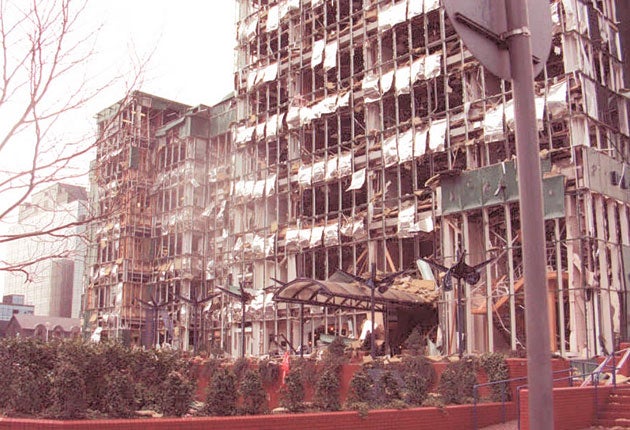Republican bombings in Britain are a 'strong possibility', says May

An attack on Britain by "Irish-related" terrorists is a "strong possibility", the Home Secretary, Theresa May, said yesterday as MI5 raised the country's threat level.
In an official acknowledgement that the chances have increased of a terrorist attack in Britain by Irish republicans, the official risk assessment – which has never been published before – was raised from "moderate" to "substantial".
It means that a strike on England, Scotland or Wales is now considered "a strong possibility", raising concerns about a return to the type of attacks seen in Britain in the Eighties and Nineties. They were carried out mainly by the Provisional IRA. The current threat is posed by dissident republican groups whose members are opposed to the peace deal reached under the Good Friday Agreement in 1998.
One such group is the Real IRA, which was behind the Omagh bomb in August 1998 – the worst atrocity of the Troubles. It is believed it was also behind the last Irish republican attack on Britain – a car bomb in Ealing, west London, in 2001 which injured seven people. The Real IRA threatened earlier this month to target banks and other financial institutions in the City of London, accusing them of "financing Britain's colonial and capitalist system". The organisation has been held responsible for 30 attacks or attempted attacks so far this year.
In a statement yesterday, the Home Secretary said: "Judgments are based on a broad range of factors, including the intent and capabilities of terrorist groups.
"This is the first time we have published the Irish-related threat assessment to Great Britain. This is in the interests of transparency and to encourage people to remain vigilant. I would urge the public to report any suspicious activity to the police and security services in their continuing efforts to discover, track and disrupt terrorist activity."
A Home Office spokeswoman added the public would see no visible difference in terms of policing in the UK. Despite the rise, the threat is still only at level three out of five, with "severe" and "critical" the two higher options.
The threat is also not considered as great as that posed by international terrorism from groups such as al-Qa'ida. That threat level is classed as severe, meaning an attack is "highly likely". Jonathan Evans, the director general of MI5, took the decision to raise the threat level yesterday. In a speech in London last week, Mr Evans said while MI5's "main effort" remained focused on international terrorism, it had been necessary to reinforce its presence in Northern Ireland to deal with the heightened threat.
He said: "Perhaps we were giving insufficient weight to the pattern of history over the last hundred years, which shows that, whenever the main body of Irish republicanism has reached a political accommodation and rejoined constitutional politics, a hard-liner rejectionist group would fragment off and continue with the so-called 'armed struggle'.
"We cannot exclude the possibility that they might seek to extend their attacks to Great Britain as violent republican groups have traditionally done," he added.
Subscribe to Independent Premium to bookmark this article
Want to bookmark your favourite articles and stories to read or reference later? Start your Independent Premium subscription today.

Join our commenting forum
Join thought-provoking conversations, follow other Independent readers and see their replies